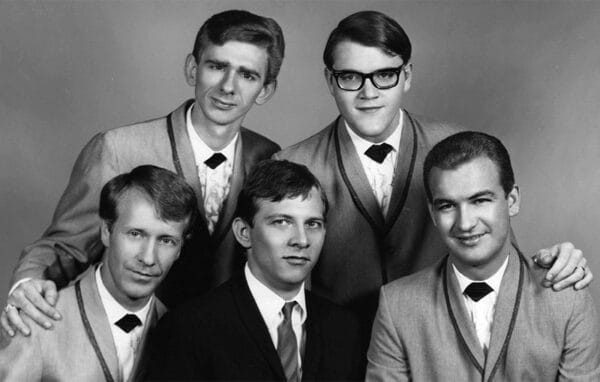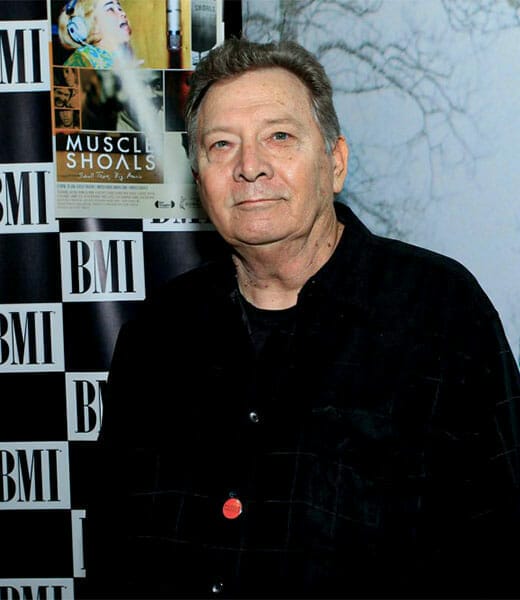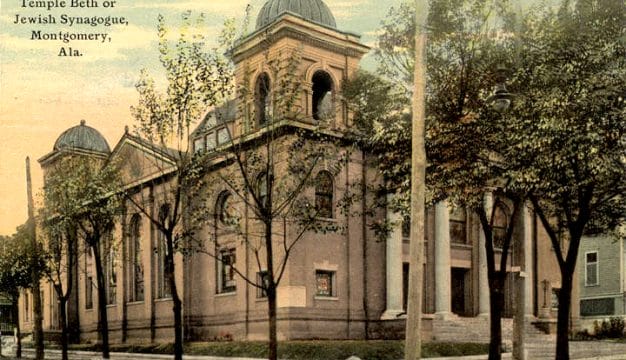Dan Penn
 Dan Penn, David Briggs, and Spooner Oldham
Wallace Daniel Pennington (1941- ) of Vernon, Lamar County, is a songwriter, singer, producer, and guitarist. Dan Penn, as he is known professionally, is best known as the co-writer (with Lincoln “Chips” Moman) of Aretha Franklin’s “Do Right Woman–Do Right Man” (1967) and also James Carr’s “The Dark End of the Street.” He is also known for his work with fellow Alabamian and keyboard player Dewey “Spooner” Oldham, with whom he co-wrote, among many other songs, Percy Sledge’s 1966 hit “It Tears Me Up” and “I’m Your Puppet” for James and Bobby Purify (1966). Penn played an essential role in the development of the Muscle Shoals recording scene as a songwriter signed to SPAR (Stafford Publishing and Recording) in Florence and Florence Alabama Musical Enterprises (FAME Studios) in Muscle Shoals and has enjoyed an extensive career in Memphis and Nashville.
Dan Penn, David Briggs, and Spooner Oldham
Wallace Daniel Pennington (1941- ) of Vernon, Lamar County, is a songwriter, singer, producer, and guitarist. Dan Penn, as he is known professionally, is best known as the co-writer (with Lincoln “Chips” Moman) of Aretha Franklin’s “Do Right Woman–Do Right Man” (1967) and also James Carr’s “The Dark End of the Street.” He is also known for his work with fellow Alabamian and keyboard player Dewey “Spooner” Oldham, with whom he co-wrote, among many other songs, Percy Sledge’s 1966 hit “It Tears Me Up” and “I’m Your Puppet” for James and Bobby Purify (1966). Penn played an essential role in the development of the Muscle Shoals recording scene as a songwriter signed to SPAR (Stafford Publishing and Recording) in Florence and Florence Alabama Musical Enterprises (FAME Studios) in Muscle Shoals and has enjoyed an extensive career in Memphis and Nashville.
 Dan Penn and the Pallbearers
Penn was born November 16, 1941, in the farming community of Molloy, Lamar County, near the Mississippi state line. He developed an ear for music through his father, who led congregational “singings” at Nebo Methodist Church in Molloy and had a string band. In addition, Penn’s school teacher Garvis Moore was an accomplished fiddler and encouraged Penn to sing and play songs such as Patty Page’s “Seven Lonely Days,” which he had learned by listening to radio broadcasts from Birmingham. As a teenager, Penn was enamored with early rock and roll singers such as Elvis Presley, Gene Vincent, Jerry Lee Lewis, and Roy Orbison. He was also influenced by black gospel and blues singers, including Bobby Bland, Ray Charles, Clyde McPhatter, Ivory Joe Hunter, and Big Joe Turner. Penn and his family moved to Vernon in 1957, where he continued to develop his musical talents, especially his songwriting. That year, Penn began playing with a band called Benny Cagle and the Rhythm Swingsters at the American Legion in nearby Sulligent and after a few months became the band’s lead singer. One of the demos the group recorded was his “Is a Bluebird Blue?,” which became a hit for Conway Twitty around 1959. When the song became a hit, Penn joined Broadcast Music Inc. (BMI) and soon recorded his own record, “Crazy Over You” backed with “You Don’t Treat Me Right.” Penn began playing with the Mark V, a band in the Muscle Shoals area that was popular but struggled to be profitable. After a brief stint in Dallas, Texas, working as a mail-order clerk for a publishing firm, he returned to Vernon and began working six nights a week with some former Mark V band mates in a Birmingham night club called The Y. He later formed Dan Penn & The Pallbearers, through which he began to work with Spooner Oldham.
Dan Penn and the Pallbearers
Penn was born November 16, 1941, in the farming community of Molloy, Lamar County, near the Mississippi state line. He developed an ear for music through his father, who led congregational “singings” at Nebo Methodist Church in Molloy and had a string band. In addition, Penn’s school teacher Garvis Moore was an accomplished fiddler and encouraged Penn to sing and play songs such as Patty Page’s “Seven Lonely Days,” which he had learned by listening to radio broadcasts from Birmingham. As a teenager, Penn was enamored with early rock and roll singers such as Elvis Presley, Gene Vincent, Jerry Lee Lewis, and Roy Orbison. He was also influenced by black gospel and blues singers, including Bobby Bland, Ray Charles, Clyde McPhatter, Ivory Joe Hunter, and Big Joe Turner. Penn and his family moved to Vernon in 1957, where he continued to develop his musical talents, especially his songwriting. That year, Penn began playing with a band called Benny Cagle and the Rhythm Swingsters at the American Legion in nearby Sulligent and after a few months became the band’s lead singer. One of the demos the group recorded was his “Is a Bluebird Blue?,” which became a hit for Conway Twitty around 1959. When the song became a hit, Penn joined Broadcast Music Inc. (BMI) and soon recorded his own record, “Crazy Over You” backed with “You Don’t Treat Me Right.” Penn began playing with the Mark V, a band in the Muscle Shoals area that was popular but struggled to be profitable. After a brief stint in Dallas, Texas, working as a mail-order clerk for a publishing firm, he returned to Vernon and began working six nights a week with some former Mark V band mates in a Birmingham night club called The Y. He later formed Dan Penn & The Pallbearers, through which he began to work with Spooner Oldham.
 FAME Studios, Muscle Shoals
After marrying in 1962, Penn moved the following year to Muscle Shoals, where he was hired as FAME’s first resident songwriter and also recruited the studio’s first house band. At FAME, Penn learned the business of recording and marketing from founder Rick Hall, with whom he toured the region’s black radio stations promoting and distributing rhythm and blues singer Jimmy Hughes’s “Steal Away” (1964), FAME’s first hit on its own label. Penn and Spooner Oldham had their first national R&B hit with Joe Simon’s “Let’s Do It Over,” which spent four months in the Top 20 in 1965. The pair then wrote the well-known songs “It Tears Me Up” and “I’m Your Puppet” and, with Rick Hall and Oscar Frank, “You Left the Water Running.”
FAME Studios, Muscle Shoals
After marrying in 1962, Penn moved the following year to Muscle Shoals, where he was hired as FAME’s first resident songwriter and also recruited the studio’s first house band. At FAME, Penn learned the business of recording and marketing from founder Rick Hall, with whom he toured the region’s black radio stations promoting and distributing rhythm and blues singer Jimmy Hughes’s “Steal Away” (1964), FAME’s first hit on its own label. Penn and Spooner Oldham had their first national R&B hit with Joe Simon’s “Let’s Do It Over,” which spent four months in the Top 20 in 1965. The pair then wrote the well-known songs “It Tears Me Up” and “I’m Your Puppet” and, with Rick Hall and Oscar Frank, “You Left the Water Running.”
Penn left Alabama and began working in Memphis in 1966 for Press Publishing. In 1967, he joined “Chips” Moman at American Sound Studio, a collaboration that resulted in “The Dark End of the Street” (1967), which has since been performed by other notable performers. They also co-wrote “Do Right Woman–Do Right Man,” recorded by Aretha Franklin in January 1967. Later that year, Penn produced the Box Tops’ No. 1 hit “The Letter” and three Box Tops albums: The Letter, Cry Like A Baby, and Nonstop. He also produced four more of their singles: “Neon Rainbow,” “Choo Choo Train,” “Cry Like A Baby,” and “I Met Her In Church,” the latter two songs co-written with Oldham. That pair also composed “Sweet Inspiration” for female vocal group The Sweet Inspirations; the song was covered later by Barbra Streisand.
After leaving American Studio, Penn opened his own studio, Beautiful Sounds, in Memphis and recorded his solo debut Nobody’s Fool in 1972. The record became a cult classic and featured a number of Penn and Oldham songs, notably “Ain’t No Love” and “Raining in Memphis.” The album also included “Tear Joint” co-written with country star Donnie Fritts and “I Hate You” co-written with Leroy Daniel. Penn and Fritts also contributed “Rainbow Road” to Arthur Alexander’s 1972 eponymous album.
In 1991, Penn and Moman’s “The Dark End of the Street” and “Do Right Woman–Do Right Man” were featured in the Oscar-nominated film The Commitments, about an Irish soul band, and brought renewed interest in Penn’s work. He and Oldham teamed up again that year for a performance at New York’s Bottom Line music venue. The following year, Penn released a solo album, Do Right Man, which featured songs from Penn and Oldham’s Muscle Shoals heyday. Penn and Oldham’s 1998 live album, Moments From This Theatre, demonstrates their musicianship and the longevity of their material.
 Dan Penn
As the millennium approached, Wilson Pickett covered “Soul Survivor,” co-written by Penn, for Pickett’s It’s Harder Now (1999). In 2000, Irma Thomas recorded My Heart’s in Memphis: The Songs of Dan Penn, which features 13 songs by Penn written in collaboration with others. Penn with Bucky Lindsay and Carson Whitsett composed “Don’t Give Up On Me” for Solomon Burke’s award winning album of the same name in 2002, which became the title song for the 2009 hit musical Don’t Give Up On Me.
Dan Penn
As the millennium approached, Wilson Pickett covered “Soul Survivor,” co-written by Penn, for Pickett’s It’s Harder Now (1999). In 2000, Irma Thomas recorded My Heart’s in Memphis: The Songs of Dan Penn, which features 13 songs by Penn written in collaboration with others. Penn with Bucky Lindsay and Carson Whitsett composed “Don’t Give Up On Me” for Solomon Burke’s award winning album of the same name in 2002, which became the title song for the 2009 hit musical Don’t Give Up On Me.
Penn currently lives in Nashville, Tennessee, where he owns a studio and continues to write and produce. He has formed a label, Dandy Records, and has released two CDs, Blue Nite Lounge (2001) and Junkyard Junky (2008). In 2012, he released The Fame Recordings, which featured 23 unreleased songs from his years in Muscle Shoals. In 2013, he was inducted into the Alabama Music Hall of Fame. That same year, he appeared in Muscle Shoals, a documentary about the musical legacy of the Muscle Shoals sound.
Additional Resources
Gordon, Robert. It Came From Memphis. New York: Simon and Schuster, 1995.
Guralnick, Peter. Sweet Soul Music: Rhythm and Blues and the Southern Dream of Freedom. Boston: Back Bay Books, 1999.
Hoskyns, Barney. Say It One Time for the Broken Hearted: The Country Side of Southern Soul. London: Fontana Paperbacks, 1987.
Marsh, Dave. The Heart of Rock and Soul. New York: Plume, 1989.


